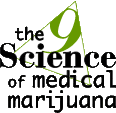This website
sponsored by:
What to Do about Medical Marijuana: Policy Recommendations by Prestigious Organizations & Experts
Coalition of 17 U.S. AIDS advocacy organizations (February 1999)
[The groups sent a letter with this request to key federal officials Feb. 18, 1999]
"[T]he standard Food and Drug Administration approval process has been streamlined for several medications important to people living with HIV disease and AIDS. Drugs shown to fall within an acceptable standard of safety have been made available to patients before completion of all scientific trials proving effectiveness. This special procedure has helped thousands of patients to obtain life extending benefits from new medications, and has contributed directly to building the science base for such new drugs."
"Our request is simple. Just as other promising AIDS medications have been made available prior to final FDA approval, so too should marijuana, when recommended by a physician, be made available to patients who choose to use it."
*Official representatives of the following groups signed the letter: AIDS Action Council (Washington, D.C.); San Francisco AIDS Foundation; AIDS Project Los Angeles; National Latina/o Lesbian, Gay, Bisexual and Transgender Organization (Washington, D.C.); Colorado AIDS Project;The Center for AIDS Services (Oakland, CA); Mobilization Against AIDS (San Francisco); Boulder County (CO) AIDS Project; AIDS National Interfaith Network (Washington, D.C.); National Native American AIDS Prevention Center (Oakland, CA); Health Force: Women and Men Against AIDS (Bronx, NY); Latino Commission on AIDS (New York, NY); AIDS Foundation of Chicago; Mothers Voices to End AIDS (New York, NY); Whitman-Walker Clinic (Washington, D.C.); Northwest AIDS Foundation (Seattle); Being Alive (Los Angeles); AIDS Project Arizona; People of Color Against AIDS Network (Seattle).
Jerome Kassirer, M.D., editor, New England Journal of Medicine (January 1997)
"The government should change marijuana's status from that of a Schedule 1 drug (considered to be potentially addictive and with no current medical use) to that of a Schedule 2 drug (potentially addictive but with some accepted medical use) and regulate it accordingly."
"To ensure its proper distribution and use, the government could declare itself the only agency sanctioned to provide the marijuana."
Judge Francis Young, Chief Administrative Law Judge, Drug Enforcement Administration (September 1988)
"the administrative law judge concludes that the provisions of the [Controlled Substances] Act permit and require the transfer of marijuana from Schedule I to Schedule II. "
"The administrative law judge recommends that the Administrator [of DEA] conclude that the marijuana plant considered as a whole has a currently accepted medical use in treatment in the United States, that there is no lack of accepted safety for use of it under medical supervision and that it may lawfully be transferred from Schedule I to Schedule II. The judge recommends that the Administrator transfer marijuana from Schedule I to Schedule II."
House of Lords, United Kingdom (November 1998)
"...the government should take steps to transfer cannabis and cannabis resin from Schedule I of the Misuse of Drugs Regulations to Schedule 2 ...to allow doctors to prescribe an appropriate preparation of cannabis ...and to allow doctors and pharmacists to supply the drug prescribed."
"clinical trials of cannabis for the treatment of MS and chronic pain should be mounted as a matter of urgency."
"we recommend that research be promoted into alternative modes of administration (e.g. inhalation, sub-lingual, rectal) which would retain the benefit of rapid absorption offered by smoking, without the adverse effects."
"[Officials of] the Government have said repeatedly that, if sufficient evidence in favour of cannabis as a medicine were produced for the MCA to be prepared to license it, they would amend the Misuse of Drugs Regulations so as to permit it to be prescribed. The problem with this policy is that it will take several years at least for this to happen.... We do not believe that this position is satisfactory."
British Medical Association (November 1997)
"BMA urges the government to "consider changing the Misuse of Drugs Act to allow the prescription of cannabinoids to patients with certain conditions causing distress that are not adequately controlled by existing treatments."
Consumer Reports (May 1997)
"In the same spirit the FDA uses to hasten the approval of cancer drugs, federal laws should be relaxed in favor of states' rights to allow physicians to administer marijuana to their patients on a caring and compassionate basis."
"Consumer reports urges the federal government to permit further research in this area, in order to better determine the drug's efficacy and side effects."
National Institutes of Health -- Expert Panel on Medical Utility of Marijuana (August 1997)
"Marijuana looks promising enough to recommend that there be new controlled studies done."
"Whether or not the NIH is the primary source of grant support for a proposed, bona fide clinical research study, if that study meets U.S. regulatory standards ... [and receives] protocol approval, ... the study should receive marijuana."
AIDS Action Council (November 1996)
The group "supports the elimination of federal restrictions that bar doctors from prescribing marijuana for medical use by individuals with HIV/AIDS."
The group "supports reopening the U.S. Public Health Service's Investigational New Drug Compassionate Access program to provide access to medical-use marijuana for greater numbers of qualified patients."
Florida Medical Association (June 1997)
"The FMA urge[s] the state and federal governments and U.S. Public Health Service to open limited access to medical marijuana by reopening the investigational new drug program to new applicants."
The FMA also "urge[s] Congress, the FDA, DEA and all other relevant governmental agencies to expedite unimpeded research into the therapeutic potential of smokable marijuana."
American Academy of Family Physicians (1995)
The group supports "the use of marijuana ... under medical supervision and control for specific medical indications."
American Bar Association (organization policy, reiterated May 1998)
The ABA "supports federal legislation to establish a program under which [seriously ill] patients can be treated with marijuana under the supervision of a physician and under such controls adequate to prevent any diversion or other improper use of medicinal marijuana."

